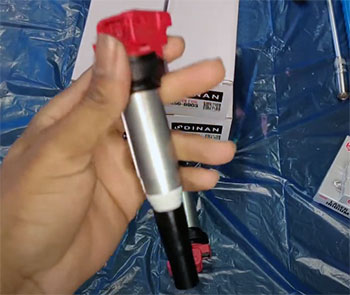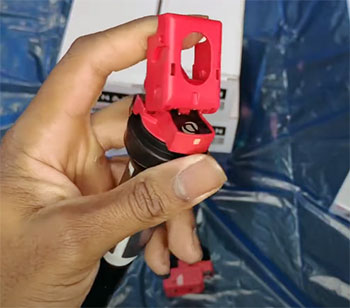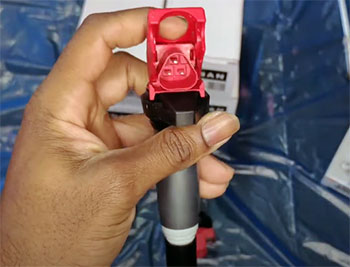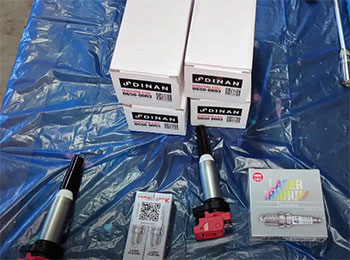When I decided to upgrade the ignition system on my BMW, I knew I wanted something that could deliver both performance and reliability without breaking the bank.
That’s when I stumbled upon Dinan ignition coils, a product that promised up to 10% more spark energy than stock and a sleek design to match.
After installing them and putting them through their paces, I’m convinced these coils are a solid choice for any BMW enthusiast looking to maintain or enhance their ride’s performance.
If you’re after a plug-and-play upgrade that offers value and a touch of style, Dinan ignition coils are worth your attention.
My Experience With Dinan Ignition Coils
I’ve been driving my 2016 BMW 340i xDrive for a few years now, and while it’s always been a joy to drive, I noticed some subtle hiccups during cold starts—slight shivers, a bit of hesitation, nothing major but enough to make me curious about upgrading.
My car’s got a Dinan Stage 1 tune, so I’m no stranger to pushing its limits, and I figured the ignition coils might be a good place to start.
After some research, I decided to give Dinan’s ignition coils a shot, especially since they were marketed as a direct replacement with a bit more punch than OEM.

Installing the coils was a breeze. I’m no master mechanic, but with a basic toolkit and a YouTube tutorial, I had the old coils out and the new Dinan ones in within an hour.
The red housing with the Dinan logo caught my eye right away—it’s a shame the engine cover hides them, but knowing they’re there adds a little swagger to my engine bay.
I went with the N-series style coils, as my car’s production date post-2002 required them, and the fitment was spot-on.
No wobbly connections or awkward clips, just a clean, secure snap into place.
Once I fired up the engine, the difference was noticeable. The cold-start shivers were gone, replaced by a smooth, confident idle.
Acceleration felt crisper, especially in the mid-range, where my car used to feel a tad sluggish.
I’ve put about 5,000 miles on these coils, including some spirited drives through winding backroads, and they’ve held up flawlessly.
I was initially skeptical about the “up to 10% more energy output” claim, but after feeling the improved throttle response and seeing no misfires even under aggressive driving, I’m a believer.
The coils seem to handle the extra demand from my tune without breaking a sweat.
One thing I appreciated was the price. At around $30 per coil, they were cheaper than OEM BMW coils, which can run close to $100 each.
I also liked the color options—red, blue, or black—though I went with red for that extra pop.
My only gripe during the install was that cylinder 6 was a pain to reach, but that’s more a BMW design quirk than a fault of the coils.
Overall, my experience has been overwhelmingly positive, and I’m glad I made the switch.
These coils have given my car a subtle but meaningful boost, making every drive just a bit more exciting.
Read More: My Thoughts On Spidertrax Wheel Spacers
Pros Of Dinan Ignition Coils
- Improved spark energy: Dinan claims their coils deliver up to 10% more energy than stock, and I can vouch for the difference. The stronger spark translates to smoother idling and better combustion, especially noticeable during cold starts or under heavy throttle. My 340i feels more responsive, particularly in the 3,000–5,000 RPM range, where it used to hesitate slightly.
- Cost-effective compared to OEM: At roughly $30 per coil, Dinan’s offering is a steal compared to BMW’s factory coils, which can cost triple that. For someone like me who’s budget-conscious but still wants quality, this was a major selling point. You’re getting a performance upgrade without the dealership price tag.
- Plug-and-play installation: Swapping out the coils was straightforward, requiring no special tools or modifications. The fitment was perfect for my N-series BMW, and the connectors clicked in securely. Even if you’re not a gearhead, you can handle this upgrade with basic know-how.
- Aesthetic appeal with color options: The red, blue, and black housing options add a touch of personality to your engine bay. While the engine cover hides them, it’s nice to know there’s some style under there. I went with red, and it feels like a small nod to my car’s sporty spirit.
- Reliability under high demand: With my Dinan Stage 1 tune pushing the engine harder, I was worried about coil durability. But after 5,000 miles, including some aggressive driving, I’ve had zero misfires or issues. These coils seem built to handle the extra stress of tuned engines.
- Backed by a reputable brand: Dinan’s partnership with MSD, a well-known name in performance ignition systems, adds credibility. Knowing these coils are produced by a trusted supplier gave me confidence in their quality, and so far, they’ve lived up to the hype.
The combination of performance, affordability, and ease of installation makes these coils a no-brainer for BMW owners looking to maintain or enhance their car’s performance. They’re not just a replacement part; they feel like a genuine upgrade that adds a little extra zest to your drive.
Cons Of Dinan Ignition Coils

- Limited performance gains for stock engines: If your BMW is completely stock, you might not notice a huge difference with these coils. The extra spark energy is most beneficial for tuned or high-performance setups. For my tuned 340i, the improvement was clear, but if you’re not pushing your engine, the upgrade might feel subtle.
- Color options are hidden: I love the red housing, but let’s be real—you’re not going to see it unless you remove the engine cover. It’s a minor letdown that such a cool aesthetic feature is tucked away, especially if you’re hoping to show off your engine bay at a car meet.
- No clear longevity data: While my coils have been flawless for 5,000 miles, there’s not much long-term data out there on Dinan coils since they’re relatively new. Some users on forums like E90Post have reported 10,000–12,000 miles with no issues, but I’d love to see more evidence of their durability over 50,000 miles or more.
- Potential skepticism about branding: There’s some chatter online about whether Dinan coils are just rebranded OEM coils from their supplier, MSD. While I haven’t seen evidence to confirm this, it’s worth noting that Dinan isn’t manufacturing these themselves, which might make you question the “premium” label.
- Not a universal fit for all BMWs: Dinan offers coils for many BMW models, but you need to double-check your engine type and production date (M-series vs. N-series). I got lucky with my post-2002 340i, but if you’ve got an older model, you might need to dig into the specs to ensure compatibility.
These drawbacks don’t outweigh the benefits for me, but they’re worth considering. If you’re not running a tuned engine or don’t care about the hidden aesthetics, you might want to weigh whether the upgrade is worth the cost, especially if your stock coils are still performing well.
Maintenance Tips For Dinan Ignition Coils

- Regularly inspect for wear: I make it a habit to check my coils every 10,000 miles or during spark plug changes. Look for cracks in the housing or signs of corrosion on the connectors. Catching issues early can prevent misfires, which I’ve avoided so far by keeping an eye on things.
- Pair with quality spark plugs: To get the most out of your Dinan coils, I recommend using high-quality spark plugs like NGK or Bosch. I went with NGK plugs gapped at 0.022 inches, and the combo has been rock-solid. Mismatched or worn plugs can stress the coils and reduce their lifespan.
- Keep the engine bay clean: Dust and debris can build up around the coils, especially if you drive in dusty areas like I do on occasion. I use compressed air to gently clean the engine bay every few months, ensuring no gunk interferes with the coil connections.
- Monitor for misfires: If you notice rough idling or a check-engine light, it could be a sign of a failing coil. I keep an OBD-II scanner handy to check for misfire codes. So far, my Dinan coils haven’t thrown any, but staying proactive is key to avoiding bigger issues.
- Avoid extreme heat exposure: High under-hood temperatures can degrade coils over time. I park in the shade when possible and avoid idling for long periods in hot weather. If you’re in a hot climate, consider a heat shield or reflective tape around the engine bay to protect the coils.
- Replace all coils at once: When one coil starts to fail, the others might not be far behind. I replaced all six in my 340i at once to ensure consistent performance. It’s a bit of an upfront cost, but it’s saved me from having to revisit the job too soon.
Following these tips has kept my Dinan coils performing like new. They’re not high-maintenance, but a little care goes a long way in ensuring they last. By staying on top of inspections and pairing them with the right plugs, you can maximize their performance and avoid headaches down the road.
Comparison With Other Brands

OEM BMW Coils
BMW’s factory coils, often made by Bremi or Delphi, are the baseline for most owners. They’re reliable, with some lasting over 100,000 miles, but they come with a steep price tag—often $80–$100 each. I found Dinan coils to be a better value, offering similar reliability with a slight performance edge for less money. However, OEM coils are a safer bet for older models where fitment might be an issue, as BMW’s quality control is top-notch. If you’re not chasing extra spark energy, OEM coils are a solid, if pricey, choice.
Delphi Coils
Delphi is a common aftermarket option, especially for those looking to save a buck. I considered them for my 340i, but their reputation is mixed—some users report failures within a few thousand miles, while others praise their longevity. Dinan coils, in my experience, feel more consistent, especially with my tuned engine. Delphi’s pricing is close to Dinan’s, but I trust the MSD-backed Dinan coils more for high-performance applications. If you’re on a tight budget and your car is stock, Delphi might suffice, but I’d lean toward Dinan for peace of mind.
Bosch Coils
Bosch is another big name, and their coils are often OEM for older BMWs. I’ve heard great things about their performance, especially in eliminating issues like the infamous 4,000 RPM dip in some models. However, Bosch coils can be hit-or-miss with newer engines, and some are made in China, raising quality concerns. Dinan coils edge out Bosch in price and aesthetics, and I didn’t notice any performance dip compared to what I’ve read about Bosch. If you’re loyal to Bosch’s reputation, they’re a strong contender, but Dinan’s value proposition is hard to beat.
Eldor Coils
Eldor coils have a cult following in the BMW community, with some users swearing they’ve solved performance issues like misfires on tuned engines. I was tempted to try them, but their higher cost and bulkier design put me off. Dinan coils are sleeker and cheaper, and I haven’t missed the supposed benefits of Eldor’s output. That said, Eldor might be the go-to for heavily modified builds pushing extreme boost levels. For my moderately tuned 340i, Dinan coils have been more than adequate, offering a balance of performance and affordability.
MSD Coils
Since Dinan coils are made by MSD, a direct comparison feels a bit redundant, but it’s worth noting that MSD’s standalone coils are pricier and often designed for non-BMW applications. Dinan’s coils benefit from MSD’s expertise but are tailored specifically for BMWs, which gives them an edge in fitment and optimization. I chose Dinan over generic MSD coils because of the brand’s focus on BMW performance, and I haven’t regretted it. If you’re not driving a BMW, MSD’s own coils might be worth exploring, but for BMW owners, Dinan’s version is the better pick.
Read More: My Thoughts On Bora Wheel Spacer
Frequently Asked Questions (FAQ)
Choosing the best ignition coil for your BMW depends on your needs and budget. I’ve had a great experience with Dinan coils, which offer a slight performance boost and excellent value at around $30 each. They’re reliable for tuned engines like my 340i and come with MSD’s backing. However, OEM BMW coils, often made by Bremi or Delphi, are a safe bet for stock setups due to their proven longevity. Eldor coils are popular for high-performance builds, while Bosch and Delphi are solid aftermarket options. For me, Dinan strikes the perfect balance of cost, performance, and reliability.
Some Delphi ignition coils are manufactured in China, which has raised eyebrows among BMW enthusiasts. From what I’ve gathered, the quality can vary depending on the batch and where they’re sourced. I opted for Dinan coils to avoid potential inconsistencies, as they’re produced by MSD with a focus on performance. That said, many users report no issues with Delphi coils, especially when bought from reputable suppliers like FCP Euro. If you’re considering Delphi, check the origin and stick with trusted retailers to ensure you’re getting a quality product.
OEM ignition coils, like those from BMW, are designed specifically for your car, ensuring perfect fitment and long-term reliability—some last over 100,000 miles. However, they’re expensive, often costing $80–$100 each. Aftermarket options like Dinan, which I use, can match or even exceed OEM performance for less money, especially in tuned setups. The catch is that not all aftermarket coils are equal—some, like cheaper Chinese brands, fail quickly. For me, Dinan’s coils have been as reliable as OEM but with better value and a slight performance edge.
High-performance ignition coils, like Dinan’s, can make a difference, but it depends on your setup. On my tuned 340i, the 10% extra spark energy from Dinan coils improved throttle response and eliminated cold-start issues. For stock engines, the difference might be subtle, as OEM coils are already efficient. However, in high-performance or forced-induction builds, stronger coils ensure better combustion under stress, reducing misfires. If you’re pushing your BMW hard, like I do, high-performance coils are worth it for the added reliability and slight performance boost.
Conclusion: For Dinan Ignition Coils
After months of driving with Dinan ignition coils, I’m sold on their value and performance. They’ve smoothed out my BMW’s idle, boosted responsiveness, and held up under aggressive driving—all for a fraction of the cost of OEM coils. Whether you’re replacing worn-out coils or upgrading for a tuned engine, Dinan delivers a reliable, stylish, and budget-friendly solution. Don’t wait for misfires to ruin your drive—grab a set of Dinan coils and feel the difference for yourself.
